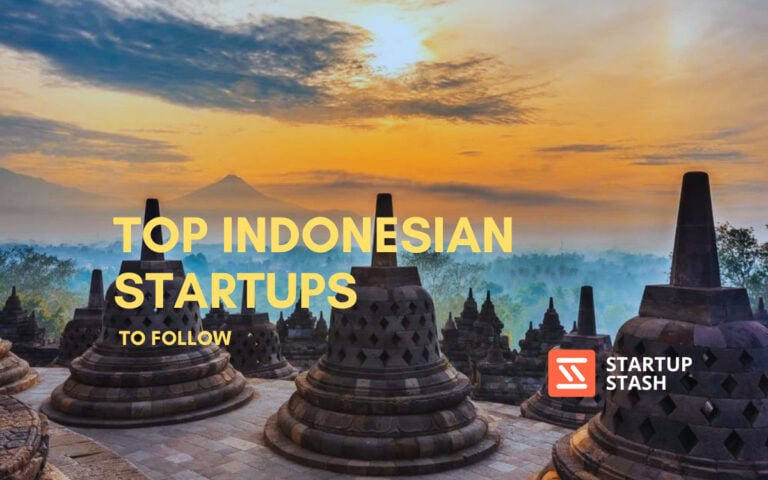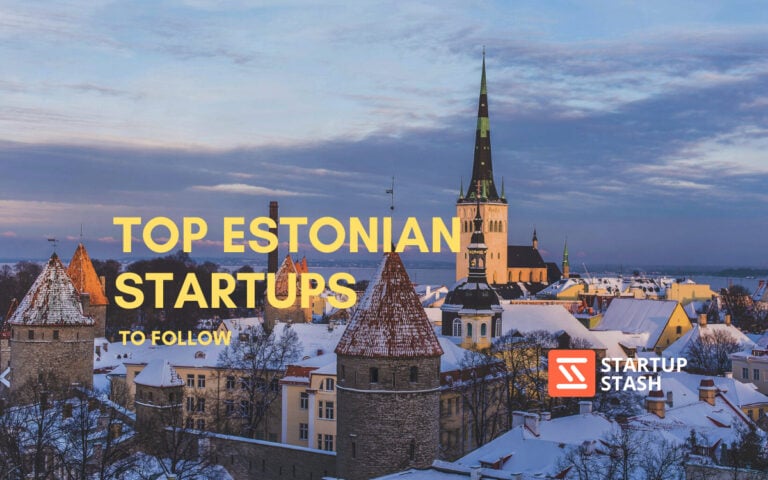Most teams discover their biggest SSE gaps during a regional rollout or an M&A cutover, not from a tidy audit report. Working across different tech companies, I have seen SSE programs derail for simple reasons like split tunnel misconfigurations, TLS 1.3 inspection edge cases, and identity failover that never triggers. The platforms that succeed are the ones that fuse SWG, CASB, ZTNA, and DLP behind a high-performance private backbone, rather than stitching point products together after the fact.
By 2026, SSE is no longer a niche security architecture. It sits at the center of secure access, performance, and vendor consolidation strategies as organizations retire VPNs and legacy proxies. Market projections show sustained growth for SASE overall, which underscores how critical SSE has become to enterprise networking and security roadmaps. Selection here focused on security depth, network quality, and operational clarity. You will learn where each tool fits best, what it actually does in production, and which limitations tend to surface during rollout, policy design, or day-to-day operations.
Zscaler
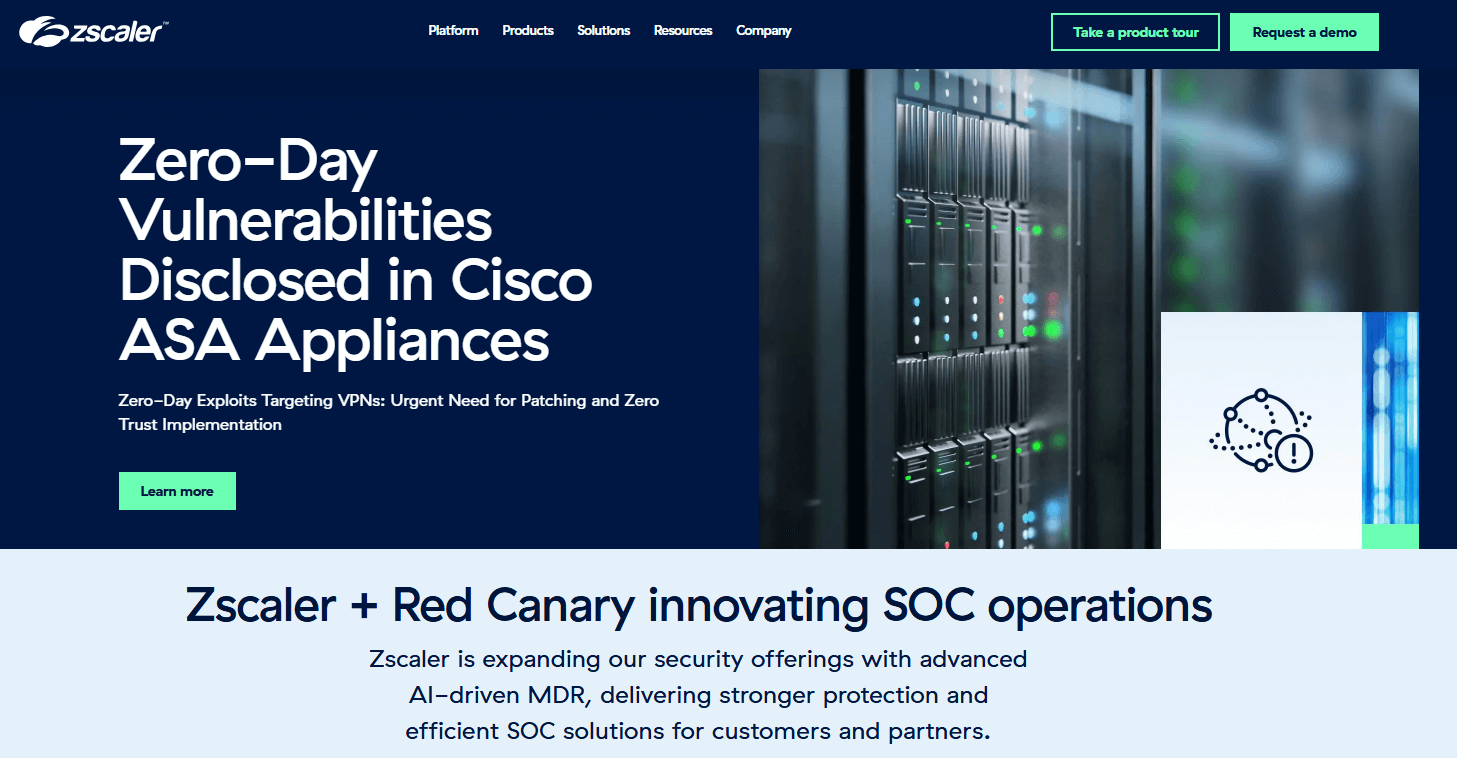
Cloud‑native SSE built on a global proxy architecture that combines SWG, CASB, ZTNA, and data protection in one policy engine. Emphasis on large‑scale internet and private app access with a very broad PoP footprint.
- Best for: Enterprises that need mature zero trust at scale, including regulated environments that require FedRAMP High and regional accreditations, as highlighted in 2024 analyst and press coverage. (GlobeNewswire on Zscaler MQ 2024 and accreditations)
- Key Features: SWG, CASB API and inline controls, ZTNA for private apps, advanced DLP, cloud firewall and optional browser isolation, per vendor documentation.
- Why we like it: Consistent policy model and log streaming options make it easier to standardize on one enforcement layer across internet and private apps.
- Notable Limitations:
- Admin learning curve and policy order can be confusing, and some users report latency or bandwidth issues depending on tunneling choices and regions. (G2 Zscaler reviews on complexity and performance, user reports on bandwidth variability)
- Short default portal log retention without external SIEM export is a common complaint for investigations. (G2 review notes on retention)
- Pricing: Pricing not publicly available. Contact Zscaler for a custom quote.
Netskope One SSE
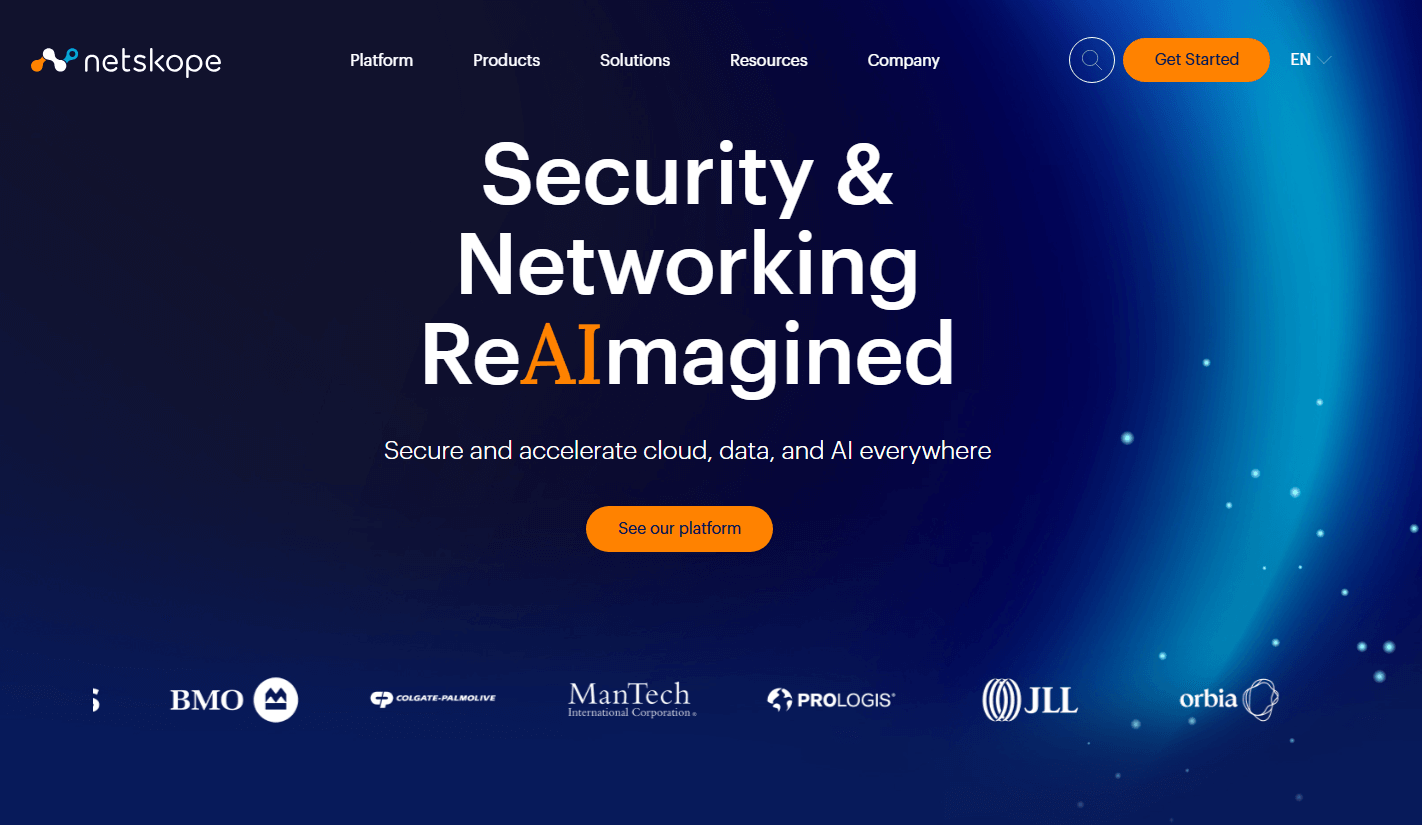
Unified SSE platform that integrates SWG, CASB, ZTNA, DLP, and threat protection over a private backbone. Known for data protection depth and broad inline and API controls.
- Best for: Organizations prioritizing strong data security with integrated DLP and large SaaS coverage, validated by multiple analyst evaluations. (Forrester Wave SSE Q1 2024 press coverage, Gartner MQ SSE 2025 press coverage)
- Key Features: SWG, CASB API and inline, ZTNA, DLP with exact data match and classifiers, remote browser isolation and threat protection, per vendor documentation.
- Why we like it: Excellent balance of in‑line controls and API‑based SaaS governance, plus a global private network that helps with UX.
- Notable Limitations:
- Reviewers cite agent quirks, learning curve, and occasional browser or Google Workspace performance incidents that required mitigations. (G2 Netskope One cons, community note on Chrome TLS 1.3 early data symptom)
- Licensing can feel expensive for full suites in some mid‑market contexts. (G2 cost comments)
- Pricing: Pricing not publicly available. Contact Netskope for a custom quote.
Palo Alto Networks Prisma Access
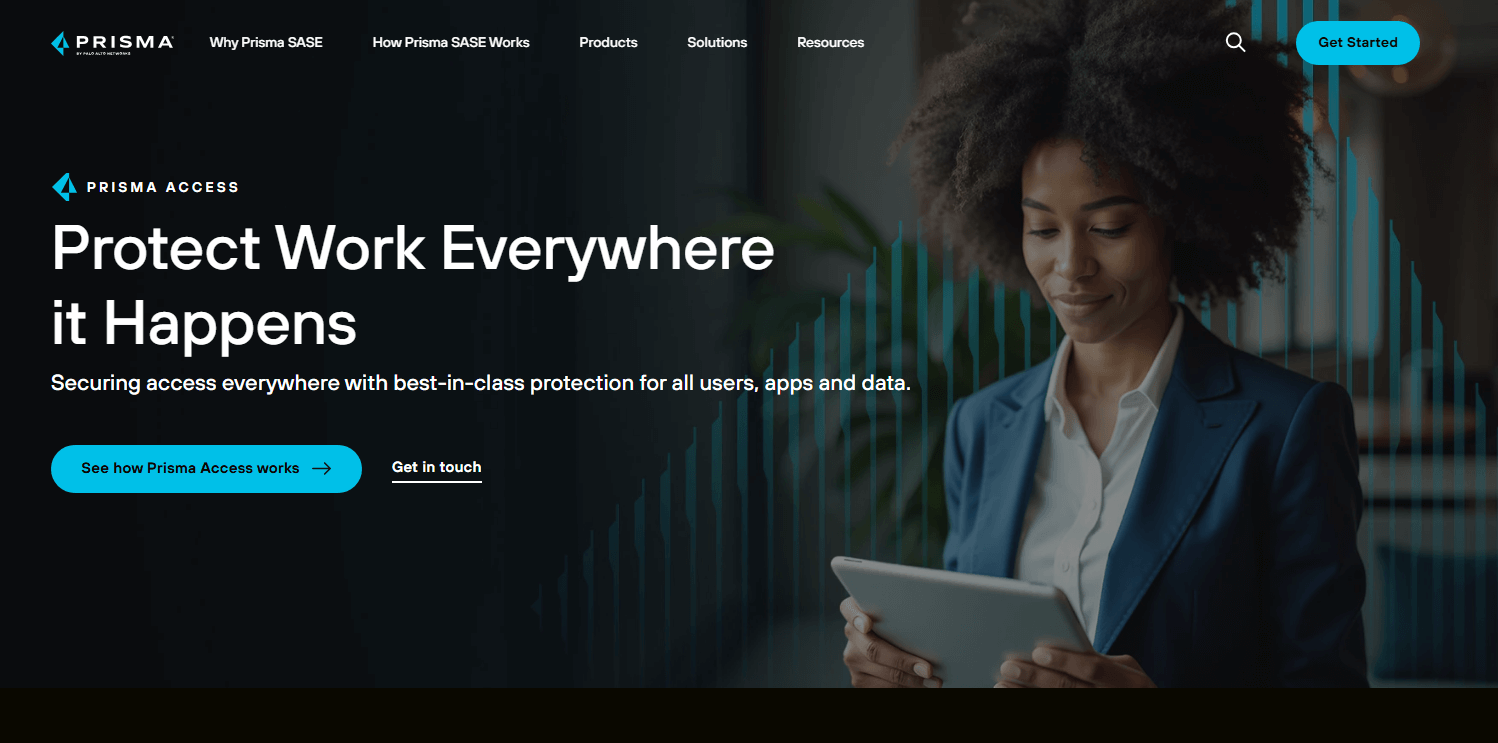
Cloud‑delivered SSE that pairs SWG, CASB, ZTNA, FWaaS, and threat prevention with the Palo Alto ecosystem. Strong use case for teams standardizing on Panorama or broader Palo Alto tooling.
- Best for: Palo Alto shops that want unified policy and analytics across on‑prem firewalls and cloud access while adding ZTNA and cloud SWG. (G2 Prisma Access overview and pros)
- Key Features: Cloud SWG, ZTNA, CASB, FWaaS, advanced threat prevention, optional browser isolation, per vendor documentation.
- Why we like it: Tight integration with existing Palo Alto management and security services, which reduces tool sprawl for existing customers.
- Notable Limitations:
- Multiple reviewers and practitioners flag initial setup complexity, documentation gaps for advanced scenarios, and support responsiveness variability. (G2 cons on complexity and support, community threads on client and performance)
- Professional services may be pushed during quotes for new deployments, adding to cost considerations. (community discussion of required PS line items)
- Pricing: Pricing not publicly available. Contact Palo Alto Networks for a custom quote.
Skyhigh Security Service Edge
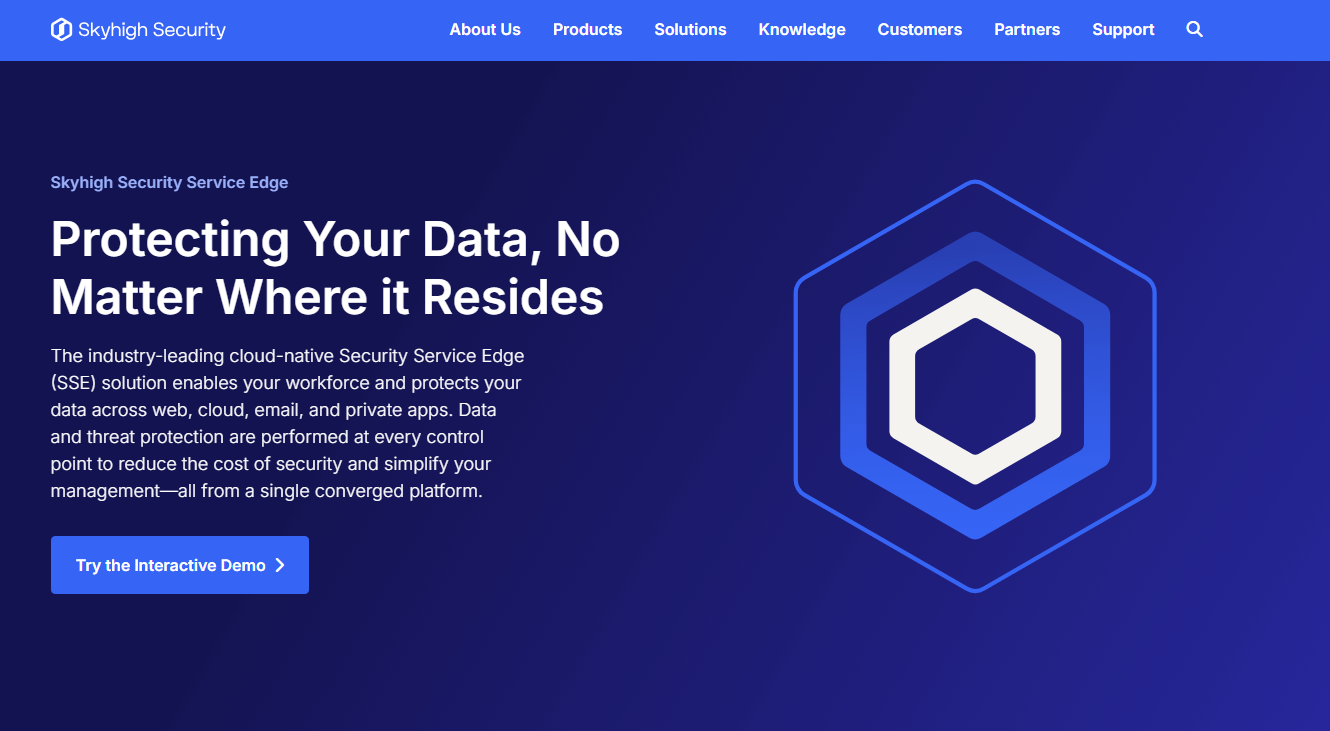
Cloud‑native SSE for web, cloud, and private apps with data‑centric controls. Heritage from the McAfee Enterprise cloud portfolio, now operating as an independent brand under STG.
- Best for: Teams that want data‑first SSE with integrated DLP across SaaS, web, and private apps, and that value long‑running enterprise deployment experience. (STG launch and background)
- Key Features: SWG, CASB, ZTNA, integrated DLP, and browser isolation, per vendor documentation.
- Why we like it: Data protection focus shows up across controls and reporting, which helps reduce overlap between legacy DLP and SSE policy sets.
- Notable Limitations:
- Users mention UI and reporting friction, slow console transitions, and integration asks, with some Mac endpoint agent criticisms. (PeerSpot cons summary, G2 SWG reviews calling out UI and agent pain points)
- On‑prem SWG appliances exist historically but are on EOL clocks, steering buyers to cloud management. (EOL notice for specific SWG appliance series)
- Pricing: Pricing not publicly available. Contact Skyhigh Security for a custom quote.
Cloudflare One

Unified Zero Trust and SSE delivered on a massive global edge, combining SWG, ZTNA, CASB, RBI, and network controls with frequent platform updates.
- Best for: Organizations that prize global performance, quick rollouts, and frequent product shipping, including new capabilities like quantum‑ready ZTNA, covered widely in 2025 tech press. (Barron's coverage of quantum‑safe ZTNA)
- Key Features: SWG, ZTNA, CASB, RBI, device posture, DNS and HTTP filtering, per vendor documentation.
- Why we like it: Strong developer and network DNA shows up in fast deployments, along with constant security feature releases.
- Notable Limitations:
- Community feedback highlights support tier friction on lower plans and shorter default log retention for small seat counts. (user reports on support and 24‑hour logs, Trustpilot patterns)
- Some users report agent or tunnel edge cases and confusing transitions between client apps. (community threads on app migration and tunnel issues)
- Pricing: Free and paid plans exist, with Enterprise pricing not publicly posted. Multiple 2024 and 2025 news reports note Cloudflare expanding free security features and AI controls across plans. (Wired on free AI bot controls, The Verge on AI crawler blocking defaults)
Secure Service Edge (SSE) Tools Comparison: Quick Overview
| Tool | Best For | Highlights | Pricing |
|---|---|---|---|
| Zscaler | Global enterprises needing mature zero trust and compliance | Recognized Leader in multiple MQ cycles with FedRAMP High cited in 2024 coverage | Subscription, quote based |
| Netskope One SSE | Data‑centric controls with strong DLP and backbone | Leader in Forrester Wave SSE Q1 2024 and repeated MQ recognition | Subscription, quote based |
| Prisma Access | Palo Alto environments seeking unified policy and analytics | Strong fit for Palo Alto fleets, with clear ZTNA plus advanced threat prevention | Subscription, quote based |
| Skyhigh Security | Data‑centric SSE across web, SaaS, private apps | Independent brand spun out of McAfee Enterprise for SSE focus | Subscription, quote based |
| Cloudflare One | Fast global rollout and continuous feature cadence | Network scale and frequent updates, including quantum‑safe ZTNA and AI security controls | Tiered plans plus Enterprise quotes |
Secure Service Edge (SSE) Deployment Options
| Tool | Cloud API | Integration Complexity | Notes |
|---|---|---|---|
| Zscaler | Yes | Moderate to higher | Per admin reviews on policy learning curve |
| Netskope One SSE | Yes | Moderate | With agent considerations from reviews |
| Prisma Access | Yes | Higher | Setup complexity noted by reviewers |
| Skyhigh Security | Yes | Moderate | UI and reporting friction cited, legacy appliances EOL |
| Cloudflare One | Yes | Lower to moderate | User reports of onboarding confusion on lower tiers |
Secure Service Edge (SSE) Strategic Decision Framework
| Critical Question | Why It Matters | What to Evaluate | Red Flags |
|---|---|---|---|
| Do we need data‑centric controls first, or access controls first? | Determines priority between DLP and ZTNA maturity | Classifiers, EDM/OCR coverage, inline and API protections, private app segmentation | DLP bolted on after SWG with poor SaaS API coverage |
| How sensitive are we to last‑mile latency? | SSE policy is only as good as the path | Private backbone reach, PoP density, digital experience monitoring | Sparse points of presence or vendor‑blended third party backbones |
| What compliance or government accreditations do we need? | Impacts shortlisting and rollout regions | FedRAMP, regional certifications, data residency scope | Unclear audit story, or certifications only in a fraction of target regions |
| How much change management can we absorb? | Complex policies and agents need time | Policy modeling, testing tools, rollback, log retention and export | Short log windows, opaque policy order, limited rollback visibility |
Problems & Solutions
-
Problem: VPN sprawl increases lateral movement and breaks user experience.
- Why it matters: SSE shifts from network trust to identity and app trust, which is why ZTNA is central in analyst definitions. (Gartner MQ overview of SSE scope)
- How tools help:
- Zscaler, Netskope, Palo Alto Prisma Access, Skyhigh Security, and Cloudflare One all include ZTNA to replace or minimize legacy VPN reliance, a trend highlighted across 2024 and 2025 research and press updates. (Netskope MQ 2025 coverage, Fortinet MQ 2025 press mention for SSE context)
-
Problem: SaaS data exfiltration and Shadow IT.
- Why it matters: Buyers increasingly favor converged controls to secure web, SaaS, and private apps from one SSE stack. Gartner notes rapid SSE adoption on this exact point, with a majority of organizations procuring these capabilities from SSE offerings by mid‑decade. (Business Wire article quoting Gartner's SSE adoption forecast)
- How tools help:
- Netskope and Skyhigh emphasize integrated DLP and CASB for SaaS governance, repeatedly cited by analysts and customer reviews. (Forrester Wave SSE Q1 2024 press coverage, PeerSpot Skyhigh pros and cons)
- Zscaler and Prisma Access pair inline controls with cloud app awareness, which reviewers say simplifies policy once deployed. (G2 Zscaler overview, G2 Prisma Access overview)
-
Problem: Dealing with risky sites and modern web threats.
- Why it matters: Browser‑delivered threats and unknown sites are a top path to compromise. RBI and content isolation are common SSE add‑ons to contain this risk. Recent analyst and vendor announcements show RBI is now table stakes in most shortlists.
- How tools help:
- Netskope, Skyhigh, Prisma Access, Zscaler, and Cloudflare offer RBI options to isolate risky browsing while preserving productivity, referenced across reviews and product briefs. (G2 Skyhigh SWG RBI mentions)
-
Problem: Performance and UX issues during or after rollout.
- Why it matters: SSE only works if the path is fast and the agent is stable.
- How tools help and where to watch:
- Netskope, Zscaler, and Prisma Access, all with repeated MQ and Wave mentions, focus on backbone reach and PoP density, but user reports still cite intermittent slowdowns and learning curves, especially during early deployment. (Netskope leader coverage noting private network, Zscaler admin and bandwidth reports)
- Cloudflare One's pace of feature delivery is a plus, yet community feedback flags log retention limits for small teams and occasional tunnel or client conflicts that need tuning. (community log retention comments, community tunnel or client threads)
- Palo Alto Prisma Access reviewers often highlight initial complexity and documentation gaps, so plan a staged rollout and budget for expert time. (G2 Prisma Access cons)
The Bottom Line on Secure Service Edge
Secure Service Edge has become the default control plane for web, SaaS, and private application access. By 2026, the question is no longer whether to adopt SSE, but how cleanly it replaces VPNs, reduces policy sprawl, and preserves user experience at scale. The market’s growth reflects this shift, but buyer success still depends on execution, not brand recognition.
If data protection is your primary driver, Netskope and Skyhigh stand out for integrated DLP and SaaS controls. If you already run Palo Alto infrastructure, Prisma Access offers policy continuity across environments. Zscaler remains a strong choice for large enterprises that need global scale and regulatory coverage. Cloudflare One appeals to teams that prioritize fast rollout, global performance, and a rapid feature cadence.
Pricing transparency varies widely, so total cost of ownership should be treated as a deployment exercise, not a spreadsheet estimate. Pilot in your most demanding regions, validate identity and failover paths, and export logs to your SIEM from day one to avoid investigation gaps. The SSE platforms that win long term are the ones that survive real traffic, real users, and real change events without becoming the bottleneck.
